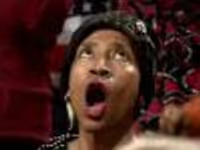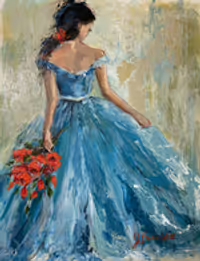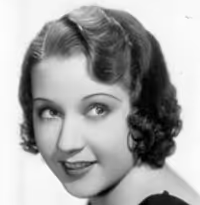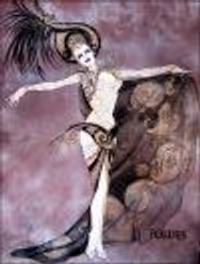Cameron Mackintosh transphobic comments
#75Cameron Mackintosh transphobic comments
Posted: 8/29/21 at 10:12amRafiki is female in the stage show. Julie Taymor writes about it in the book. She wanted a stronger female presence in the show.
#76Cameron Mackintosh transphobic comments
Posted: 8/29/21 at 11:27am
How is this not beside the point? Why is it so hard for folks to stay focused on the subject? CM is talking about casting a trans person in general, not making a creative choice based on an actor's persona. As I said before, substitute gay or jewish for trans and you should see why this is so offensive.
The Scorpion
Leading Actor Joined: 1/3/07
#77Cameron Mackintosh transphobic comments
Posted: 8/30/21 at 6:30am
Fosse76 said: "Call_me_jorge said: "I’m kind of shocked Disney hasn’t forced their hand into making him issue an apology. Kind of appalled. Does Disney not have any meaningful involvement in Mary Poppins?"
Disney is pretty powerless. The only reason they have any involvement is because CM smartly understood that any stage adaptation would need the Disney music. CM owns the stage rights in full."
Is this really the case? I thought Disney did have meaningful involvement/rights since they forced a rebranding of the original production (logo and all) plus changes to the score (e.g. the removal of 'Temper Temper'![]() to make the show more kid-friendly and less dark.
to make the show more kid-friendly and less dark.
As for Cameron, does he never use PR people any more before spouting his mouth off? This is at least the third ridiculous comment he's made this year at least (the others I can think of being his appalling comments about Phantom's fired orchestra members and calling social distancing "foolish" ).
#78Cameron Mackintosh transphobic comments
Posted: 8/30/21 at 8:25am
Disney doesn't need to say anything. Mackintosh did this on his own. I don't know why some feel the need to ask why Disney hasn't said anything. If he said Phantom instead of Mary Poppins, would we be asking for Andrew Lloyd Webber, and Michael Crawford to make a statement, no. This makes it seem like, let's see if we can expose others in my disapproval.
Also, Hogan is exactly right when they say, "CM is talking about casting a trans person in general, not making a creative choice based on an actor's persona. As I said before, substitute gay or Jewish for trans and you should see why this is so offensive".
#79Cameron Mackintosh transphobic comments
Posted: 8/30/21 at 10:04am
The Scorpion said: "As for Cameron, does he never use PR people any more before spouting his mouth off?"
I don't see why he'd need to. He's a very powerful figure in UK theatre, and I'd guess that his primary audiences aren't the sort of people who would pay attention to things like this.
#80Cameron Mackintosh transphobic comments
Posted: 8/30/21 at 10:43am
JBroadway said: "I don't see why he'd need to. He's a very powerful figure in UK theatre, and I'd guess that his primaryaudiences aren't the sort of people who would pay attention to things like this."
Wow. Seriously? I hate to break the news to you but, even if you think UK theatregoers are as awful as you are making them out to be, his "primary audience" is the people he needs to make theatre and they ARE the sort of people who would pay attention to things like this. It's an interesting development that both of the big deals of 1980s UK theatre have almost simultaneously demonstrated a sad downward spiral. Time to get out some of those Arthur Price forks.
#81Cameron Mackintosh transphobic comments
Posted: 8/30/21 at 10:47am
I must have worded my post poorly, Hogan. I didn't meant to imply anything about UK audiences necessarily - I was referring more to the fact that his shows, and most of the shows that he books in his theatres (except maybe the Wyndhams and the Noel Coward) are broad-appeal shows that would likely cater to tourists, families, school groups, and average citizens on a night out. Not necessarily people who are keyed into the theatre world enough to follow controversies like this, or even necessarily know who Mackintosh is.
EDIT: But you're right to point out that an intense internal controversy among theatre-makers might enough to harm his career. That seems to be what happened with Rudin, after all.
#82Cameron Mackintosh transphobic comments
Posted: 8/30/21 at 11:10am
we are on the same page. Regardless of theatregoers, the one thing I learned a long time ago is that you cannot make theatre for them to pay for if you can't get the people you need to work with you.
#83Cameron Mackintosh transphobic comments
Posted: 8/30/21 at 11:25am
Does anyone have access to the original article in the Telegraph? The Daily Mail is basically the NY Post and is fraught with totally misrepresenting other people’s content to create clickbait. Not that I doubt it’ll really make a difference, but I am curious to how this actually came about.
"Hey little girls, look at all the men in shiny shirts and no wives!" - Jackie Hoffman, Xanadu, 19 Feb 2008
WestEndGal
Broadway Star Joined: 6/25/18
#84Cameron Mackintosh transphobic comments
Posted: 8/30/21 at 11:51amTheater twitter represents a small minority of the theater going public, and by their nature they are the most vocal and liberal. Whilst CM’s comments are awful, outside of twitter outrage this isn’t going to have any impact on shows connected to CM, or probably CM’s career. I’ll bet if you went out on the streets and asked them what they thought of CM’s comments, 99% would not even know what you’re talking about! You also just need to google Cameron Mackintosh to see that pretty much zero news outlets (including theater outlets) have mentioned this story. I also doubt actors are not going to work on CM productions in the future in protest, unless they’re so in demand or successful that they can be picky. Once again, a lot of the outrage I’m seeing from actors is performative, as usual.
Sunny11
Broadway Star Joined: 9/3/14
#85Cameron Mackintosh transphobic comments
Posted: 8/30/21 at 12:17pm
Link to the original telegraph interview.
https://www.telegraph.co.uk/news/2021/08/07/transgender-twist-classic-shows-gimmick-casting-says-top-producer/
Note that it could be behind a paywall if your free articles limit has expired.
And I think that if in the future he sees that a transgender casting would make the story better creatively then mr might. I think that what he is saying now is that he doesn’t want it to seem forced, if it came organically in the pre production process then his mind might be changed.
He might just have an image in his head of a butch 6 foot tall Mary Poppins with stubble and doesn’t have much experience of a “passing” MtF trans person.
#86Cameron Mackintosh transphobic comments
Posted: 8/30/21 at 12:35pm
Sometimes it takes people a minute to adjust to a changing world. I still mess up people's pronouns occasionally but I try every day to improve. Cameron does not appear to want to change, improve, or be better.
So, f*ck him.
#87Cameron Mackintosh transphobic comments
Posted: 8/30/21 at 12:41pm
I wonder if maybe the wording is getting confusing? I've copied and pasted the entire Telegraph article here. Unless I'm totally misreading it, he's not saying he wouldn't cast a trans performer, but a show like Mary Poppins shouldn't be rewritten to make the character trans, because that's not the story it wants to tell.
TRANSGENDER TWIST ON CLASSIC SHOWS IS ‘GIMMICK CASTING’, SAYS TOP PRODUCER
Sir Cameron Mackintosh says young writers and composers should create diverse roles for performers rather than change established pieces
Classic West End musicals should not be rewritten to make leading transgender as it would damage the integrity of the original storylines, one of Britain’s leading theatre impresarios has said.
Sir Cameron Mackintosh said it was up to younger writers and composers to create work with transgender lead roles rather than changing established pieces with “gimmick” casting.
“You can’t implant something that is not inherently there in the story or character, that’s what I think,” he told The Telegraph. “Just to do that, that becomes gimmick casting. It’s trying to force something that isn’t natural.
“The thing that matters is that you’ve got to have a strong story and a good score.
“But you’ve also got to assume not everybody knows it, even if it’s a famous story, and that somebody coming to the show can understand it and make sense of it.
“I try to make sure that whatever talent we have, the story should always shine through.”
The producer of The Phantom of the Opera, Mary Poppins, and Les Miserables supports diversifying casting and would welcome a non-white nanny or Jean Valjean.
Discussing whether Mary Poppins, which returned to the stage at the Prince Edward Theatre on Saturday, could have a transgender twist, Mr Mackintosh explained that PL Travers' tale “was not about that, that was not the story of that family”.
But Mr Mackintosh said that casting can match the subject matter, saying: “There are a number of shows that deal with that, like Jamie and things, not quite transgender, but people finding their true selves.
“I think if the material for the piece requires it, and it’s well done, that will be popularly embraced.”
Mr Mackintosh said he was proud of the diversity he had helped bring to the stage through his many musicals, from Cats to Hamilton, but the producer believes it will be for others to define the future of West End shows.
“I’m about to be 75, so I don’t think it will be me doing that,” said the long-time collaborator of Lord Lloyd-Webber. “I’ve brought forward a lot of new voices into theatre.
“As far as creating the new genre of musicals, it isn’t going to be my generation that’s doing it, because I know what I know from my generation.
“The lucky thing for me is that my tastes in the shows that I’ve done in my 50 years are timeless tales that will continue to be done in the same way as Shakespeare is done. They are not out of date.
“How the modern generation will write that for what is the emerging sexual culture - as the boundaries get blurred, thrown upside down - is going to be for that generation to write.”
The veteran producer has warned that shows written in and of a particular cultural moment tend not to stand the test of time, but admitted that he never thought his own productions would endure through the decades.
He is confident that stage shows will become increasingly diverse in future, with producers now able to access a pipeline of talent from different communities that was unavailable when he began his career.
He said: “There has been so much awareness, and so much new talent coming up through the drama schools.
“What you want is someone, of whatever colour, coming up and saying, ‘I think I can do that’.
Sir Cameron, a fan of Mary Poppins author PL Travers’ work, sees no reason why this new talent can’t be incorporated into his production about the magical nanny which has finally been brought to the stage again after a difficult lockdown.
He said: “I can’t wait for a black or Asian or Indian Bert to come up, or a Mary Poppins, because there’s no reason why they can’t play that.
“It’s our job to tell the story with the best talent. I’m thrilled with the amount of people I have been able to bring, from all walks of life and all colours of the rainbow, to my shows.”
"Hey little girls, look at all the men in shiny shirts and no wives!" - Jackie Hoffman, Xanadu, 19 Feb 2008
#88Cameron Mackintosh transphobic comments
Posted: 8/30/21 at 12:54pm
Mackintosh's wording definitely comes across as less willfully inflammatory in context, but I think the sentiment remains the same.
Yes, it's a good point to say that writers should be creating more roles written for trans actors, and foster artists telling trans stories. And that it's probably more important in the long run to prioritize that than to prioritize trans casting in already-written shows. But that shouldn't be a reason to exclude trans actors from existing shows, especially not in the meantime, when we have yet to see a sufficient surge in trans lead roles to keep up with the number of trans actors in the industry.
And no one is suggesting "re-writing" these shows to make the characters trans. That's a straw-man argument. But even if we were, so what? How does that necessarily change the story? If casting a non-white Mary Poppins doesn't "force something that isn't natural" then why should trans casting? If casting a non-white Mary can be accepted without making the story about something else, why can't trans casting? This sort of thinking implies that stories featuring trans characters can only be about trans issues, and nothing else.
#89Cameron Mackintosh transphobic comments
Posted: 8/30/21 at 1:16pm
WestEndGal said: "Theater twitter represents a small minority of the theater going public, and by their nature they are the most vocal and liberal. Whilst CM’s comments are awful, outside of twitter outrage this isn’t going to have any impact on shows connected to CM, or probably CM’s career. I’ll bet if you went out on the streets and asked them what they thought of CM’s comments, 99% would not even know what you’re talking about! You also just need to google Cameron Mackintosh to see that pretty much zero news outlets (including theater outlets) have mentioned this story. I also doubt actors are not going to work on CM productions in the future in protest, unless they’re so in demand or successful that they can be picky. Once again, a lot of the outrage I’m seeing from actors is performative, as usual."
Did you not read the exchange above your post? This is not about "the public" and your dismissal of actors misapprehends the fulcrum of the problem he has managed to create for himself.
#91Cameron Mackintosh transphobic comments
Posted: 8/30/21 at 3:12pm
Jordan Catalano said: "Mackintosh has issued a response/clarification "
I'm glad he clarified, because while what he said isn't exactly the most-opened comments, in the context of the f*cking horrid Daily Mail, it produced far more vitriol than it ever should've.
"Hey little girls, look at all the men in shiny shirts and no wives!" - Jackie Hoffman, Xanadu, 19 Feb 2008
#92Cameron Mackintosh transphobic comments
Posted: 8/30/21 at 3:15pm
Have no idea, if this is an accurate version of what he'd been asked--"would you make Mary Poppins trans?" not "would you be willing to cast a trans performer as Mary Poppins?"--but I do like that he is officially saying it is about talent, not gender-assigned-at-birth, and that all are welcome.
This is a good thing.
#93Cameron Mackintosh transphobic comments
Posted: 8/30/21 at 3:30pm
Jordan Catalano said: "Mackintosh has issued a response/clarification "
Now he just has to prove it.
#94Cameron Mackintosh transphobic comments
Posted: 8/30/21 at 3:31pm
He had no choice. What happens next is, of course, TBD. And so much for those above who tried to dismiss this.
PlayItAgain
Broadway Legend Joined: 11/8/11
#96Cameron Mackintosh transphobic comments
Posted: 8/30/21 at 3:51pm
JBroadway said: "Mackintosh's wording definitely comes across as less willfully inflammatoryin context, but I think the sentiment remains the same.
Yes, it's a good point to say that writers should be creating more roles written for trans actors, and foster artists telling trans stories. Andthat it's probably more important in the long run to prioritize that than to prioritize trans casting in already-written shows. But that shouldn't be a reason to exclude trans actors from existing shows, especially not in the meantime, when we have yet to see a sufficient surge in trans lead roles to keep up with the number of trans actors in the industry.
And no one is suggesting "re-writing" these shows to make the characters trans. That's a straw-man argument. But even if we were, so what? How does that necessarily change the story?If casting a non-white Mary Poppins doesn't "force something that isn't natural" then why should trans casting? If casting a non-white Mary can be accepted without making the story about something else, why can't trans casting? This sort of thinking implies that stories featuring trans characters can only be about trans issues, and nothing else."
To answer your question, yes, obviously is you re-write a character who was cis as trans, that OBVIOUSLY changes the story. And in big ways. It's a whole new backstory that informs everything about that character. You've have to have a very shallow, very surface sort of book for such a big change to not inherently change the rest of the story being told.
My problem with your general argument that roles should be available to all persons is that I don't feel you or others here are consistent on the topic. I think if a character were written to be a trans person, there would be a lot of outrage expressed if a cis actor were cast. Similarly, there is all sorts of talk around here that a person of color is "playing white" when cast in a traditionally white role, and that is considered good, but if one were to suggest casting a white person who will be "playing a person of color" (I am not talking about wearing blackface, Asian makeup or anything like that; just portraying a character of another race while looking like the race they actually belong to), that would be instantly ridiculed and vetoed here. We can have a trans person as Mary Poppins, but we can't have a cis actress who has played Mary Poppins play a trans character. Audra McDonald can play the Mother Abbess or Grace Farrell or Carrie Pipperidge, but a white actress can't play Sarah from Ragtime or Sophia from The Color Purple or Bess from Porgy and Bess.
Almost no one is actually willing to be consistent on this topic.
I'd say there are roles (involving white characters as well as characters who are people of color) that do require a performer of that race, other roles where it is irrelevant. I'd say there are times a cis actor could play trans, or a trans actor could play cis, but that, too, depends specifically on the role. I'd say the more contemporary the show is, the more opportunity there is to be flexible, and I'd also say the more unreal a show is (nearly any Jerry Herman show can be slotted into this category), the more flexible the casting can be there, too. This, to me, is the most logical position, but it seems to me that most people around here aren't willing to accept it (and some will lob insults at me for suggesting it).
KFC1991
Stand-by Joined: 7/10/18
#97Cameron Mackintosh transphobic comments
Posted: 8/30/21 at 4:11pm
Joevitus: the lack of consistency has to do with traditional in-groups and out-groups. Trans people are one example of an out-group. It is not inconsistent to celebrate a trans actor taking a cis part while regretting a cis actor playing trans (which I personally have no problem with but my own opinion is neither here nor there). Both positions, while seemingly contradictory, have the same goal: to foster opportunity for trans actors.
Same with race: celebrating MacDonald getting traditional white parts is consistent with regretting for example a white actress playing Bess. The white actress has far more opportunities that she doesn't need to play a black part.
We live in an unequal world. Someday it might not be a big deal when a member of an in-group plays a member of an out-group, but we aren't there yet.
#98Cameron Mackintosh transphobic comments
Posted: 8/30/21 at 4:14pm
@joevitus, the "lack of consistency" that you're noting comes from an impulse to balance what's already unbalanced, and account for the nuanced realities of the past and present.
In a world without systemic oppression, anyone could play any role, but we don't live in that world.
On a practical level, it partly has to do with job availability. When someone faces systemic obstacles that make it more difficult for them to get jobs, active choices have to be made to counter those systemic obstacles. There are very few roles written for trans actors, so when there ARE trans characters, casting cis actors denies them that role. And likewise, casting trans actors in traditionally cis roles is another method of alleviating the lack of opportunities for trans actors.
And on more symbolic / artistic level, we've seen historically that allowing marginalized communities to tell their own stories yield more respectful, accurate portrayal - and most of the time, it actually yields better art. Not always, not exclusively. There are of course, exceptions. But this is what the general trend indicates, and that, combined with the job issue, is really the heart of this "unequal" "inconsistent" viewpoint.
And ok, yes - maybe I was being a bit hyperbolic by implying that making Mary Poppins an actual trans character wouldn't change the story at all. But my points are that:
(a) adding a layer to the character doesn't have to change what the story is ABOUT at its core - Mary Poppins can still be a story about family, with a trans character in it.
(b) Yes, if Mary Poppins were trans, some people would find it distracting. And yes, we want to have stories that are specifically about trans experiences. But we also want to live in a world where a trans person can play a trans role without that being the entire focus of the character, and we only get to that point by creating more examples of it.
(c) frankly, IDGAF that PL Travers didn't envision the character as trans. It's an adaptation, and making bold choices like that can make the story better. I don't know if that's actually true of Mary Poppins, but I would be open to seeing it. I'm reminded of Maybe Burke on the Lortel podcast talking about how they always envisioned Cinderella as a trans character, because there's a lot in Cinderella's story that mirrors trans experiences. Maybe not true of Mary Poppins, but it's the mindset I'm talking about.
(d) After all that, a reminder again that we can have suspension of disbelief in these cases, and casting a trans actor in the role doesn't have to mean that the character is trans. Though with his clarification, it sounds like Mackintosh acknowledges this, which I agree is good (assuming he's sincere)
EDIT: I realize that some of these points above conflict with each other. Maybe they can't all be applied to the same work of art at the same time, but we can and should see all of these mindsets reflected in different stories, and any one of them could be a way of approaching a trans person playing a traditionally cis role.
#99Cameron Mackintosh's Comments Were NOT Transphobic
Posted: 8/30/21 at 4:18pm
FANtomFollies said: "Now he just has to prove it."
Mackintosh has nothing to prove.
Videos









